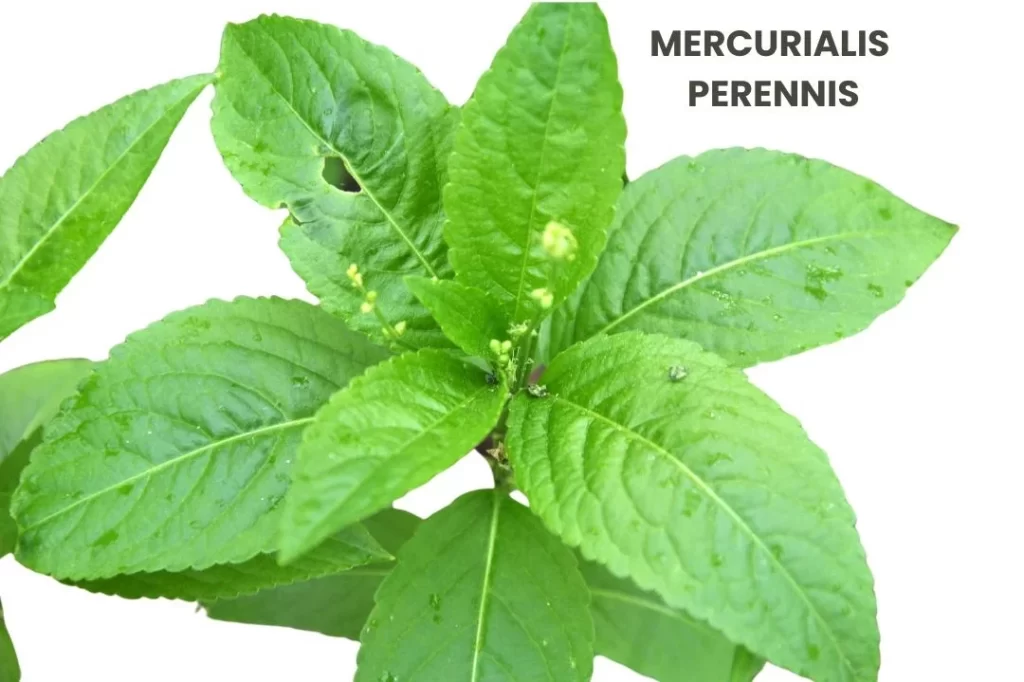Mercurialis Perennis, commonly known as Dog’s Mercury, is a medicinal plant used in homeopathy primarily for its effects on exhaustion, gastrointestinal disorders, and menstrual irregularities.
It is noted for its specific actions on the muscular fibers of the stomach, intestines, and bladder.

Table of Contents
ToggleSOURCE INFORMATION
Scientific Classification
- Kingdom: Plantae
- Clade: Tracheophytes
- Order: Malpighiales
- Family: Euphorbiaceae
- Genus: Mercurialis
- Species: Mercurialis perennis
Origin
- Dog’s Mercury, scientifically known as Mercurialis Perennis, is native to Europe and parts of western Asia.
- It thrives in woodland habitats and is often found in moist, shaded areas.
Historical Use
- Throughout history, Dog’s Mercury has been recognized for its medicinal properties.
- It has been utilized in traditional herbal medicine primarily for its diuretic and purgative effects.
- Historical records indicate its use in treating various ailments, including skin conditions, digestive issues, and as a topical remedy for wounds and inflammations.
Cultural Significance
- In ancient times, Dog’s Mercury was also used in rituals and ceremonies by certain cultures, particularly due to its association with woodland and fertility symbolism.
Botanical Description
- Dog’s Mercury is a perennial herbaceous plant that typically grows up to 30-40 cm in height. It has smooth, lanceolate leaves arranged in opposite pairs along the stem. The flowers are small, greenish, and appear in clusters.
- The plant produces small, round fruits containing seeds.
Habitat
- It prefers damp, shady conditions and is commonly found in deciduous woodlands, forest edges, and along stream banks.
- It thrives in nutrient-rich, well-drained soils.
Current Status
- While historically used in herbal medicine, Dog’s Mercury is now primarily valued for its ecological role in native habitats.
- It serves as food and habitat for various wildlife species, contributing to biodiversity conservation efforts.
DRUG PATHOGENESIS
- Mercurialis Perennis exerts its therapeutic effects on various symptoms related to exhaustion, drowsiness, and specific affections of the muscular fibers in the gastrointestinal tract and bladder.
- It is indicated for conditions such as vertigo, headache, dryness of mouth and throat, menstrual irregularities, and oral ulcers.
KEY CHARACTERISTICS
HEAD SYMPTOMS
- Vertigo: Especially when descending stairs.
- Confused Head: Feeling of mental confusion.
- Headache: Pain across the forehead as if from a tight band.
- Nasal Symptoms: Sore nostrils, sensation of having two noses.
MOUTH AND THROAT SYMPTOMS
- Dryness: Great dryness of mouth and throat.
- Tongue: Tongue feels heavy, dry, and numb.
- Blisters: Burning blisters on tongue, lips, and cheeks.
- Ulcers: Ulcers on palate, tonsils, and back of pharynx.
- Dry Throat: Sensation of dryness in the throat.
FEMALE SYMPTOMS
- Menstrual Issues: Amenorrhea (absence of periods), scanty menses with intense cramps.
- Breast Symptoms: Pain and swelling of breasts.
MODALITIES
- Worse: Descending stairs, cold weather.
- Better: Warmth, rest.
WHAT ARE MODALITIES IN HOMOEOPATHY?
RELATIONSHIP WITH OTHER DRUGS
- Compare With: Borax, Croton, Euphorbium (related remedies in terms of symptomatology).
DOSE
- Potency: Typically prescribed in the third potency.
- Administration: Dosage and frequency should be determined by a qualified homeopathic practitioner based on individual symptoms and response.
Frequently Asked Questions (FAQs)
What are the main symptoms Mercurialis Perennis is used for?
- It is used for exhaustion, drowsiness, vertigo on descending stairs, headache with a sensation of a tight band, dryness of mouth and throat, and menstrual irregularities.
How does Mercurialis Perennis affect the female reproductive system?
- It can help with amenorrhea (absence of periods), scanty menses, and painful swelling of breasts.
What are the modalities affecting its action?
- Symptoms worsen with descending stairs and cold weather, while warmth and rest provide relief.
Are there specific symptoms indicating the need for this remedy?
- Yes, such as vertigo on descending stairs, dryness of mouth and throat, and menstrual irregularities with intense cramping.
Meaning of Difficult Words
- Amenorrhea: Absence of menstrual periods.
- Dysmenorrhea: Painful menstruation.
- Euphorbiaceae: A family of flowering plants.
This detailed drug picture provides a clear understanding of Mercurialis Perennis, its indications, characteristics, modalities, and relationship with other remedies, making it valuable for practitioners and individuals considering homeopathic treatment options.
